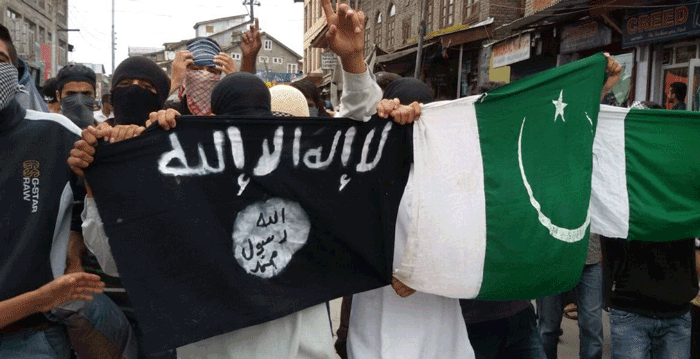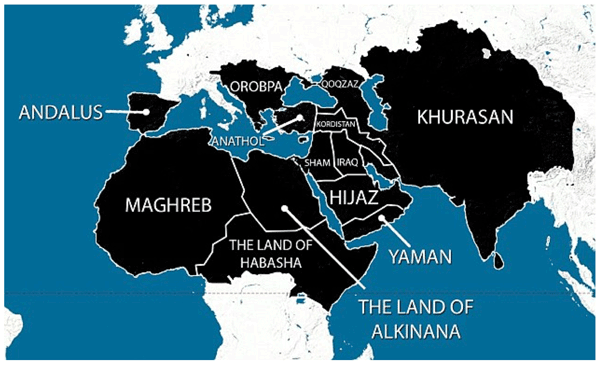An IS Caliphate in Pakistan?
By K. K. Shahid | Newsbeat National | Published 6 years ago
On May 15, the Islamic State (IS) announced the existence of its province in Pakistan, ‘Wilayah Pakistan.’ The announcement came alongside the claim of two gun attacks, both in Balochistan – one targeting the local police in Mastung, and the other aimed at rival Taliban militants. IS had also claimed the April 12 suicide bombing at Quetta’s Hazarganji market, which killed 20 people of the Hazara community.

Wilayah Pakistan: Cause for concern?
The Wilayah Pakistan is a departure from the Islamic State of Khorasan (ISK), which was founded in January 2015, to cover the Af-Pak region. The Islamic State’s Pakistan province was announced five days after its Wilayah al-Hind had claimed responsibility for the gun clashes between security forces and militants in the Amshipora village of Shopian district, in Indian-administered Kashmir.
Till last month, all attacks claimed by the IS in Pakistan, or Indian-administered Kashmir, were attributed to the Wilayah Khorasan, which on May 14, claimed multiple attacks in the Nangarhar and Kunduz provinces of Afghanistan. This suggests that the IS has decided to create sub-provinces in India and Pakistan from the original ISK, with the Wilayah Khorasan being their province in Afghanistan.
The government and security forces categorically deny the presence of IS in Pakistan, in any form. Sources within the media claim that the military establishment has even issued a blanket ban on any claims of IS operations within Pakistan, which is why the local media did not cover the group’s announcement of a separate province within the country.
The Pakistan Army’s formal denial of IS presence in the country was issued by the Inter-Services Public Relations (ISPR) Director General, Major General Asif Ghafoor, following a spree of IS-claimed attacks in Quetta last April.
Last year, the IS had claimed gun attacks and suicide bombings specifically targeting the local Christian and Hazara communities in Quetta. Following the surge in attacks, the Hazara community had staged a hunger protest, which was called off after the army chief, General Qamar Javed Bajwa personally visited the Hazara protesters. A similar protest was initiated in the aftermath of this year’s Hazarganji bombing.
Sources within the military maintain that the Pakistan Army’s refusal to acknowledge the presence of the IS stems from the fact that the group’s foot soldiers in the country are local jihadists who have gravitated towards the IS umbrella.
“The attacks in Balochistan are largely being carried out by local militants, who claim that they belong to IS, or by the groups that have an understanding with IS,” says Major General Saad Khattak, who has, in the past, served in Quetta.
“Their claims do not mean that the IS is in Pakistan. Yes, the groups and attackers share the same ideological goals, but they do not have the same resources or capabilities as the IS,” he adds.
The growth of ISK came in the aftermath of the IS’s struggles in Iraq and Levant. After having been wiped out in the Middle East, the group has wanted to shift its stronghold to South Asia. The turbulence provided by Afghanistan, the volatility of Balochistan and the growing militancy in Kashmir provide a conducive environment for IS’s brand of jihad.
Their common ideological goal is targeting the local Shia population, or other religious communities. Those groups that have formally allied with the IS include the Lashkar-e-Jhangvi (LeJ), whose Al-Alami faction has carried out attacks on the Hazara community in Balochistan.
Despite the denials by the state, many within Pakistan have long urged the government to take note of the growing presence of IS, which has claimed an array of large-scale attacks in the country, from the May 2015 Safoora Chowrangi massacre in Karachi, to the Hazarganji bombing in April this year.
The Pakistan Institute for Peace Studies (PIPS) had underlined the rise of IS in a 2017 report – before the attacks claimed by the group began to further surge in 2018. The 2017 PIPS report showcased that the IS footprint was increasing in Balochistan and Sindh, with the group having launched one of the deadliest bombings in the country’s history in Sehwan, where 90 people were killed inside the Lal Shahbaz Qalandar shrine in February 2017.
Muhammad Amir Rana, Director PIPS and author of The Militant: Development of a Jihadi Character in Pakistan, says, IS is now following the Al-Qaeda model in the country.
“Just like Al-Qaeda, they have now created separate affiliates instead of just the one Khorasan chapter,” says Rana. “This can attract many of the jihadists that haven’t affiliated themselves with any group so far, including those that weren’t lured by the failures of the Khorasan chapter,” he adds.
The growth of ISK came in the aftermath of the IS’s struggles in Iraq and Levant. After having been wiped out in the Middle East, the group has wanted to shift its stronghold to South Asia. The turbulence provided by Afghanistan, the volatility of Balochistan and the growing militancy in Kashmir provide a conducive environment for IS’s brand of jihad.

An IS map: The outline of a potential global ‘caliphate’ disseminated across the Internet.
Experts further reiterate that the splintering of many Af-Pak-based jihadist groups provides IS the manpower needed to establish its envisioned caliphate in South Asia. Furthermore, it is believed that the Indian state’s atrocities in Kashmir, coupled with the return to power of the Bharatiya Janata Party (BJP), would be used by the group to attract alienated members from the Muslim community in India.
Where everything, ranging from the establishment of an Islamic caliphate, to the undoing of the persecution of Muslims, is used by IS in its ideological machinery, security analysts maintain that a lot of the group’s power play centres around territory.
“Let’s not forget that IS was the only [jihadist] group that actually controlled any territory. After losing territory in the Middle East, it is now eying the same in South Asia,” says security analyst, and former federal secretary at the Ministry of Defence Production, Lieutenant General Talat Masood.
“While Pakistan is obviously denying the group’s presence to safeguard its investments and to root out its propaganda within the country, the state must the take IS claims seriously. It’s unlike any other [jihadist] group that the country has had to deal with.”


